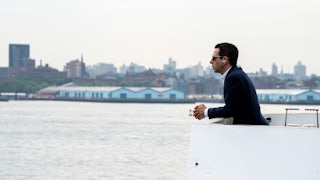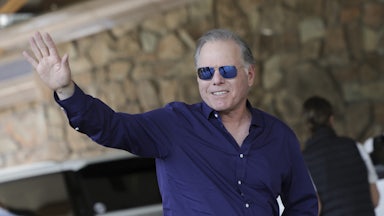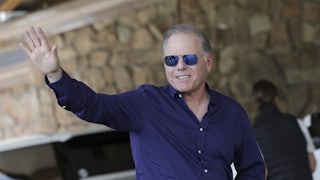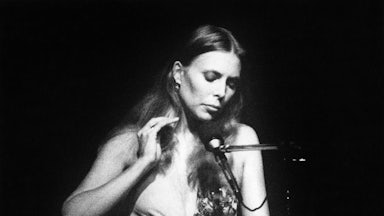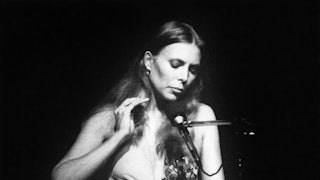TV has never done the classroom terribly well. For all the vaunted—even inaccurate!—specificity contemporary television has brought to the courtroom or the emergency room or the police station, sites of learning remain vaguely fantastical, blank spaces. There’s lots of fun dramatic material to be mined in the social networks that surround schools and campuses, but the actual work of learning is rarely deemed interesting enough to spend too much time on. Even Netflix’s campus dramedy The Chair, for example, which nailed the pratfalls of academic bureaucracy, the small-stakes warfare of faculty argument, and, importantly, the soft marginalization of women and people of color in the academy, couldn’t manage to nudge its classroom scenes beyond cartoonish generality.
But recently that’s begun to change. Right now, we can watch the chaos of pedagogy in Quinta Brunson’s Abbott Elementary, the leftist moral education of Boots Riley’s I’m a Virgo, and the queer odes to adult education—in both singing and agriculture—of Somebody, Somewhere. In and out of the classroom, the day-to-day drama of education is, all of a sudden, not just a backdrop but a central concern of contemporary TV.
And then there’s FX’s The Bear, whose second season dropped earlier this week on Hulu. The Bear is not a show about academia or high school or college or even culinary school. It is, however, one of the best shows on television about learning—a raucous, romantic meditation on what it means to teach and to be taught.
The Bear is one of those “comedies” that’s mostly full of people crying or screaming or quietly being depressed. Created by Christopher Storer, the show is intermittently incredibly funny, but the main thing separating it from the drama category is that most of its episodes are a half-hour long. In The Bear’s breakout first season, we meet Carmy (Jeremy Allen White), a young, high-end, Michelin-starred chef who’s returned to his hometown Chicago to take over the blue-collar Italian Beef sandwich shop bequeathed to him by his older brother, Mikey, who took his own life shortly before the events of the show begin. The first season was a hilarious panic attack of a show, anchored by White’s dirtbag charisma, the tightly coiled ambition of new sous chef Sydney (Ayo Edebiri), the combustibility of cousin Richie (Ebon Moss-Bachrach), and the slowly surfacing complexity of the rest of the kitchen staff.
Like a working kitchen itself, The Bear toggled between moments of otherworldly precision and moments of sloppy madness. Some choices seemed pored over like Danish chefs tweezing microgreens; others seemed haphazard. Some characters startled with offhand richness; others felt like caricature. One standout sequence is surgically sutured to Wilco’s “Spiders (Kidsmoke)”; other scenes are soundtracked as if Storer just let his Spotify algorithm keep going for 30 minutes. The show was a mess, but, like any great workplace series—and, even for its flaws, the first season was a great workplace series—it created a world with deceptively fathomless depths to explore.
The challenge of the show’s second season, then, was to figure out a way to dive deeper, to be precise more often than not, and to do so without sacrificing anything that made the first season such a tremendous success. Storer and co-showrunner Joanna Calo decided to do this the hard way—essentially rebooting the show—and it has paid off immeasurably. At the end of the first season, after a miraculous windfall of cash, Carmy, Sydney, and the gang decide to fulfill Mikey’s lifelong dream and open a new restaurant: The Bear. The easy, perhaps even advisable thing, to do would have been to yada-yada that transition in between seasons and throw us all right back in the kitchen we love with all the corners and yes, chefs we’d missed. Instead, The Bear picks back up with the demolition of the old restaurant, the literal and figurative jettisoning of the first season’s set. That first season had been all about the high-wire struggle to keep something you love alive; the second season is about how to transform all of that wild, hurtful love into something new.
To do that, to bring new life into the world out of the disaster of the past, these people needed to change. And in order to change, they needed to learn things they didn’t know before. That’s the drama of this new season, in ways big and small, within and without the show itself.
Even a superficial accounting of what happens in the new episodes reveals this thematic core: Line-cooks Tina (Liza Colón-Zayas) and Ebraheim (Edwin Lee Gibson) are sent to a crash course at culinary school to help them both prepare for new responsibilities—Tina’s been promoted to sous chef—in the new restaurant’s haute-cuisine environment; Marcus (Lionel Boyce) travels to Copenhagen to study under Carmy’s former rival so that he can return to become The Bear’s pastry chef; Richie stages at an Alinea-esque fine dining restaurant where he discovers how to blend his natural charm with the complexities of upscale service.
But it’s not just schools and apprenticeships. Richie and Fak (Matty Matheson) watch YouTube videos to learn how to hang drywall and do electrical work; Sydney combs through Coach K’s leadership memoir for tips on how to be a leader and create a positive and efficient team culture; Carmy, in a new romantic relationship, has to figure out how to be in a romantic relationship for the first time. He doesn’t know how, he tells his girlfriend, Claire (Molly Gordon), because he skipped college to go to Copenhagen himself. Nobody knows the skills they need to grow, to survive. They all have to learn those skills wherever they can.
The Bear is now rightly famous for its operatic argument scenes—I won’t belabor this review with an accounting of the epic, cameo-heavy Feast of the Seven Fishes episode of this season. Suffice it to say that if it’s yelling you’re looking for, The Bear has a special on it this season. But the show’s best and most special work, I’ve always thought, has been done in its quiet moments. These scenes of instruction are almost all pitched at a low volume. Richie’s apprenticeship and Carmy’s romantic education are characterized mostly by whispered lessons between intimates. Tina’s schooling and Sydney’s odyssey through the culinary world of Chicago are near-silent, scored mostly by the sound of sharp knives slicing fish and vegetable and delicious baked goods being crunched by hungry mouths. Marcus’s study-abroad trip is notable not just for the soft talk between him and his tutor, Luca (Will Poulter), but also for the fact that the show’s overactive iPod shuffle of dad rock deep cuts is paused for much of the stand-alone episode that’s focused on the Copenhagen apprenticeship. The show gives not only narrative but aesthetic space to these moments of learning, some of which are so beautiful and simply profound that they might bring tears to your eyes. The overactive camera stays put, the overactive soundtrack settles down, the characters stand still, they listen, they see.
Contemporary TV can sometimes seem to move back and forth between a fascination with competence and a leering obsession with incompetence. It’s rare that a show can dwell in between these two poles of knowledge for long. The drama of development, the narrative of education, despite being an obvious structural fit for serialized television, can sometimes fall by the wayside in favor of tall tales of virtuosity and short tales of stupidity. On Succession, the show that handed the discourse off to The Bear when it ended a few weeks ago, you are either an omnipotent titan or a sniveling boob. Nobody gets better, nobody learns anything, all opportunities or suggestions for improvement are refused as insults.
The Bear refuses this polarity, even as it would be easy, perhaps, to transform into a Mad Men–style exploration of the vicissitudes of creative genius. This show, instead, embraces the humility and the humanity of the act of learning, the self-awareness and self-abnegation it requires for even the talented to admit that they don’t know everything, that there’s always more to learn. What you need, in order to dramatize this type of education, is patience. (For that reason, it was a strange choice to dump all 10 episodes at once, rather than course them out weekly over the rest of the summer.) As Luca tells Marcus, the best way to learn is to “fuck up.” And while contemporary TV shows are supposed to be “patient” at an aesthetic level, with their bottle episodes and their slow-burn plots, there are incentives to rush things along. What if the audience gets bored? What if the show doesn’t get renewed? The very idea that this show, so defined by the electricity of its kitchen, would set nearly the entire second season in a building that very conspicuously doesn’t even have its gas on, is a staggering feat of televisual derring-do. That the new season ends before the new restaurant’s official first service is as bold a storytelling gambit as I can think of.
It’s hard to imagine that a show this good at what it does—and this buzzy—will be canceled, but anything is possible. So the risk is great that The Bear might have taken the leisurely way to The Bear and cost itself the opportunity to tell the full story. But the show’s second season is an optimistic one regardless. Everybody trying to learn, everybody trying to get the gas turned on. The Bear is a narrative of education, a story of shaky masters and streaking apprentices, and the lesson is this: Stay open.


